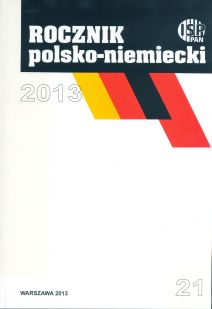Problematyka narodowościowa w spisach powszechnych ludności 2002 i 2011 roku w kontekście mniejszości niemieckiej w Polsce
The problematics of nationality in the general population censuses of 2002 and 2011, considered in the context of the German minority in Poland
Author(s): Paweł PopielińskiSubject(s): Politics / Political Sciences
Published by: Instytut Studiów Politycznych PAN
Summary/Abstract: The two most recent Polish general censuses, carried out in 2002 and 2011, excited numerous controversies among the national and ethnic minorities living in Poland. During the general census of 2002, questions regarding nationality emerged for the fi rst time since the era of the communist People’s Republic of Poland and our country’s socio-political turning-point. Both censuses addressed the matter, providing a foundation, fi rst and foremost, for the size of the German and other national minority groups to be established. On the basis of the results, the Polish government enacted the Act on National and Ethnic Minorities and Regional Languages in 2005. The representatives of national and ethnical minority groups in Poland, including the Germans, had a great many concerns regarding the way in which the general censuses were carried out. They warned the Polish authorities that the data obtained would not be fully objective, nor would they refl ect the actual numbers of the groups in question. In the article, the author details the particulars of the preparation and conducting of both general censuses. He presents the multiplicity of problems with which the national and ethnic minorities, including the Germans, were grappling and shows what the consequences of that fact have been, and are, for that group. He analyses the factors which had an impact on the numbers for the German minority, the reasons why those numbers have decreased with each general census and what has infl uenced the fact that, in the two censuses, more and more people gave their nationality as Silesian on the form, while fewer and fewer put hemselves down as being German. At the same time, he describes the phenomenon of feeling Silesian, explaining how the ‘Silesian’ national and ethnic category came to fi gure on the Central Statistical Offi ce’s questionnaire and clarifying how it should be defi ned. In addition, he focuses on what consequences the social manifestation which is the declaration of Silesian nationality, as well as the emergence of organisations centred around the Silesians who do so, might bring for the German minority movement in Poland in the future.
Journal: Rocznik Polsko-Niemiecki / Deutsch-Polnisches Jahrbuch
- Issue Year: 2013
- Issue No: 21
- Page Range: 128-159
- Page Count: 32
- Language: Polish

